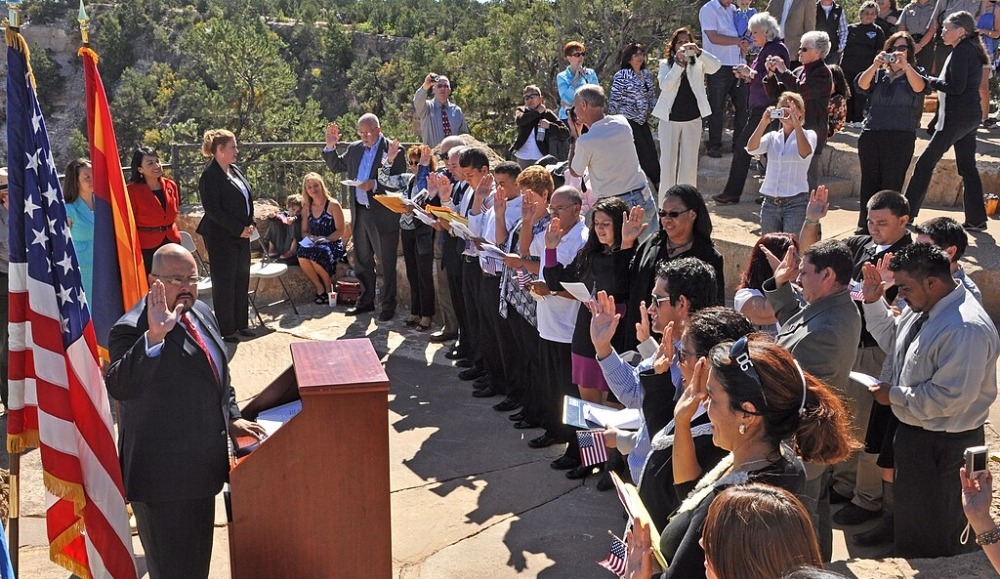Loyalty—fidelity, allegiance—is such a personal thing. I wonder what goes through new citizens’ minds when they swear to abandon loyalty to where they’ve come from and give it over to the USA. At the mass naturalization ceremony held at the Seattle Center on July 4, more than 500 immigrants from 79 nations swore to do just that.
Naturalization, recall, is the final step in the long U. S. citizenship process. My wife and I were among the spectators on the lawn between the Fisher Pavilion and the International Fountain. We didn’t know any of the newcomers but, given the times, we wanted to be part of an enthusiastic crowd.
Seated before us on the plaza, the citizens-to-be were warmly welcomed by Mayor Harrell and Senator Cantwell, and then Chief U.S. District Judge Estudillo administered the Oath of Allegiance. The immigrants stood and recited the text, their right hand raised.
Here’s what they promised. Take a minute to read it and be astonished. Notice the ands and ors in the first clause, and then the next six thats.
I hereby declare, on oath, that I absolutely and entirely renounce and abjure all allegiance and fidelity to any foreign prince, potentate, state, or sovereignty of whom or which I have heretofore been a subject or citizen; that I will support and defend the Constitution and the laws of the United States of America against all enemies, foreign and domestic; that I will bear true faith and allegiance to the same; that I will bear arms on behalf of the United States when required by law; that I will perform noncombatant service in the Armed Forces when required by law; or that I will perform work of national importance under civilian direction when required by law; and that I take this obligation freely without any mental reservation or purpose of evasion: So Help Me God.
These 135 words weigh a ton. “Absolutely and entirely” leave no wiggle room. Nor does “without any mental reservation.” And then there’s defending the Constitution and laws “against all enemies, foreign and domestic.”
I’ve discussed the oath with my UW students many times. Their goal is to be certified as middle and high school social studies teachers, and the ideas in this oath—citizenship, allegiance, obligation—are central to the history and government courses they will teach. The terms may be familiar, but their meanings are slippery. Politically, they are hot potatoes, too.
Most of these future teachers are, like me, birthright citizens, so they haven’t had occasion to consider the promises new citizens are required to make. To relinquish allegiance to a former ruler or government is no small thing itself, and to accept the duties listed next can give you pause.
How did that shift feel to the newcomers gathered on the 4th? I can tell you that my students erupt with opinions at the mere thought of it. “Why would I owe allegiance to anything but God and my family?”, someone asks. Another student is suspicious: “I bet lots of them are fibbing.” Someone wistfully offers lines from Lennon, “Imagine there’s no countries / It isn’t hard to do / Nothing to kill or die for….” Another makes a key factual point, “Your allegiance here is given to a constitution, not a person. This isn’t Hail Caesar or Heil Hitler.”
This oath is followed in the ceremony by a second with its own bundle of meanings: the Pledge of Allegiance. And this one, by state law, is recited each morning at school. Again, notice the ands.
I pledge allegiance to the flag of the United States of America, and to the republic for which it stands, one nation under God, indivisible, with liberty and justice for all.
I like to simulate the whole ceremony with my students so they can feel the moment. I wear a robe and play the judge, the two texts are distributed, and I ask the immigrants to stand as I administer the Oath, their right hand raised; and then the Pledge, hand over heart.
At the ceremony’s conclusion, I congratulate the new citizens and end the simulation. Typically, there’s a startled pause, and then opinions tumble out. If we’re lucky, juicy disagreements follow on the oaths’ purposes, the words’ meanings, and their implications for private and public life.
It can be a mind-altering discussion. You might consider it for your next book club or coffee klatch. The time is ripe, if you ask me, to talk about what citizenship means.
Discover more from Post Alley
Subscribe to get the latest posts sent to your email.
